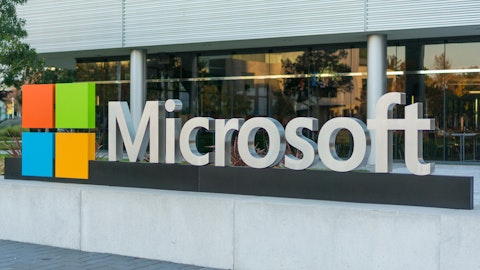Operator: The next question will come from Scott Group with Wolfe Research. Please go ahead.
Scott Group: Hey, thanks. Afternoon. I’m in a car. Hopefully you can hear me okay. John, any color how much of the $1.8 billion of DRIVE you’ve gotten so far? And then I know you said Ground margins would continue to improve year-over-year in Q2. Any thoughts on sequential margins at Ground and just across the rest of the business for Q2? Thank you.
John Dietrich: Yes. Thanks, Scott, and good to talk to you again. Yes. With regard to DRIVE, we’re — that $1.8 billion, we expect it to be reasonably spread out fairly evenly through the year. We had an exceptional Q1. We’re expecting that to continue to ratchet up in Q2, maybe slightly heavily loaded in the back half of the year as some of these programs get their traction and start to show the results through the year. So again, I won’t — I’m not going to sit here and say there’s any dramatic changes for any one quarter. It’s fairly evenly spread.
Operator: The next question will come from Chris Wetherbee with Citigroup. Please go ahead.
Chris Wetherbee: Hey, thanks. Good afternoon. Hey, John, just to follow up on that, I guess. Can you outline what the savings was realized from DRIVE in the other segments, Freight and Express and that you outlined the Ground, the $130 million there, that would be helpful. And then just wanted to sort of think about the guidance a little bit bigger picture. So it sounds like you want to hold on to or expect to hold on to a big piece of the 400,000 packages per day that you captured from a competitive standpoint. But can you walk us through the puts and takes of the guidance of what you’re adding in Yellow and maybe UPS into that and then maybe some of the macro there to help kind of bridge from where you were before to kind of moving that midpoint up a little bit?
John Dietrich: Sure. With regard to DRIVE first, it really is coming from every aspect of the organization. We highlighted Ground. But for some of the flight restructurings, for example, I think Express is doing a nice job there as well, taking down aircraft as well as revised the flight schedules and that will be a continued focus for me. I’m not going to be listing by group exactly where, specifically on the savings. But in the aggregate, what I will say is we’re committed to achieving and will achieve that $1.8 billion for the year. With regard to the guidance, look, we took a thoughtful approach on guidance. It was a strong quarter, we recognize that and we’re delighted to have been able to raise our guidance for the full year.
Not only does that reflect strong execution for the quarter but really a focus on those things that we can control amid a soft market. Things are playing out largely as we expected. And there are going to be puts and takes. Yes, we enjoyed some upside from UPS and Yellow. But as Brie mentioned, it was a soft market. There were some offsets there and yield pressure in the soft market. Also embedded in our outlook is $600 million in incremental variable compensation through the balance of the year. That’s $100 million more than our prior estimate. But at the end of the day, we’re really pleased to have increased the lower end of the range, even when we’re seeing this uncertainty, and we will keep you posted as the year progresses.
Operator: The next question will come from Brian Ossenbeck with JPMorgan. Please go ahead.
Brian Ossenbeck: Hey, thanks. Good evening. Just wanted to ask about another angle of the Teamsters contract negotiation. Obviously, we’ve seen a lot of these union contracts get reset higher. This one reset the bar for comp and benefits in logistics and I think it came in even higher than you guys expected. So do you think there’s a catch-up across the board from a cost perspective as you look across your various segments as they now deal with what was reset in the reality in the market? Thanks.
Raj Subramaniam: Yeah. Thank you, Brian. As you all know or may recall that in FY’22, we increased compensation annually to be about $1 billion. I mean, we are dealing with market conditions in real time. And we knew that our competition would see a step change, it’s exactly what happened. And also, you know we have two pickup and delivery models in the market. And while we have taken a majority of the increase, we will continue to invest in our people. That’s a given and our outlook reflects that. In fact, coming up in October, we have our annual merit increases, which are a regular and important component of our overall compensation structure. It’s also important to remember that beyond compensation, working at FedEx offers our team members a great overall value proposition, a collaborative culture and offers great career opportunities, among other things.
So it’s very important for all of us, issue for all of us, and we are staying right on top of it and we appreciate your question. Thank you.
Operator: The next question will come from Allison Poliniak with Wells Fargo. Please go ahead.
Allison Poliniak-Cusic: Hi. Good evening. Raj, you mentioned peak season, the upcoming peak season in your opening remarks. Just given sort of the dynamic environment, your approach to disciplined revenue quality and such, has your approach to this peak season changed at all? Just any color there.
Raj Subramaniam: Thank you for the question, Allison. The peak season, I would say, is that there is really no difference in our approach other than to say our service is really strong. We expect normal seasonality versus the volumes we are seeing today and probably year-over-year comparable to where we were last year. And the networks are running very well and the team is ready to support our customers during this most important season. And Brie I don’t know if you want to add any more to it than I just what I just said.
Brie Carere: No, Raj. I think you covered it. We feel good about peak. And from a pricing strategy perspective, we’re committed to our strategy, which does include peak surcharges. We think that’s really important. We need to invest in the network. This is a really important time of year for us, but it’s also a really important time for our customers. And so having that surcharge there allows us to flex the network, deliver great service. And then we’ll wind it down in January, but we see no major change in strategy.
Allison Poliniak-Cusic: Thank you.
Operator: The next question will come from Ken Hoexter with Bank of America. Please go ahead.
Ken Hoexter: Hey, great. Good evening. Mickey, best of luck in retirement. It’s been a great 18-year run. And John, welcome. Look forward to working with you. Just overall a great job in results and particularly at Ground. But at 2% margins at Express, any reason we’re not seeing maybe more leverage at Express, given the moves you’ve made with parked aircraft and the structural change you talked about? Maybe walk through some of the timing on the gains at Express in particular? And I guess to wrap it up, like given the beat of $0.80 in the quarter versus the Street, yet you’re raising the bottom target by $0.50, is that — are there softening gains the rest of the year on some of the margins? I know you talked about the $600 million in cost, but you had prior talked about $500 million. So I’m just wondering if there’s maybe some slimmer margins that you’re looking at in other areas. Thanks.
Raj Subramaniam: Well, again, let me start off, and John can add to what I say here. I think it’s important to remember for Express some of the key headwinds that we’re facing in this quarter. Firstly, the demand surcharges declined substantially year-over-year. We also opened up International Economy and the reopening of International Economy resulted in yields decline. As we have mentioned in the talk track earlier that the volumes from USPS also declined as part of their strategy. That’s number three. And then at the same time, we also have market-driven headwinds from fuel prices. So net of all that, it was a revenue decline of $1.1 billion. In addition to that, the variable compensation increase for Express was also there.





